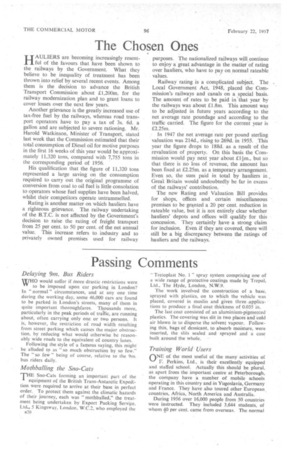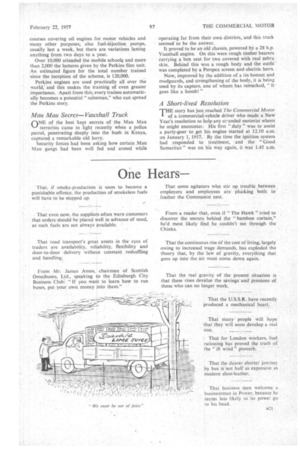Passing Comments
Page 24

Page 25

If you've noticed an error in this article please click here to report it so we can fix it.
Delaying 9in. Bus Riders
wHo would suffer if More drastic restrictions were
to be imposed upon car parking in London? In " normal " circumstances, and at any one time during the working day, some 46,000 cars are found to be parked in London's streets, many of them in quite important thoroughfares. Thousands more, particularly in the peak periods of traffic, are running about, often carrying only one or two persons. It is, however, the restriction of road width resulting from street parking which causes the major obstruction, by reducing what would otherwise be reasonably wide roads to the equivalent of country lanes.
Following the style of a famous saying, this might be alluded to as "so much obstruction by so few." The "so few" being of course, relative to the 9m. bus riders daily.
Mothballing the Sno-Cats
THE Sno-Cats forming an important part of the equipment of the British Trans-Antarctic Expedition were required to arrive at their base in perfect order. To protect them against the climatic hazards of their journey, each was "mothballed," the treatment being undertaken by Export Packing Service, Ltd., 5 Kingsway. London, W.C.2, who employed the
a20 Tretoplast No. 1 spray system comprising one of a wide range of protective coatings made by Trepol, Ltd., The Hyde, London, N.W.9.
The work involved the construction of a base, sprayed with plastics, on to which the vehicle was placed, covered in muslin and given three .applicalions to produce a final coat thickness of 0.035 in.
The last coat consisted of an aluminium-pigmented plastics. The covering was slit in two places and cold air blown in to disperse the solvent vapour. Following this, bags of dessicant, to absorb moisture, were inserted, the slits sealed and sprayed and a case built around the whole.
Training World Users
1.--INE of the most useful of the many activities of F. Perkins, Ltd., is their excellently equipped and staffed school. Actually this should be plural, as apart from the important centre at Peterborough, the company have a number of mobile schools operating in this country and in Yugoslavia, Germany and France. They have also toured other European countries, Africa, North America and Australia. During 1956 over 16,000 people from 50 countries were instructed. They included 3,644 students, of whom 40 per cent. came from overseas. The normal
courses covering oil engines for motor vehicles and many other purposes, also fuel-injection pumps, usually last a week, but there are variations lasting anything from two days to a year.
Over 10,000 attended the mobile schools and more than 2,000 the lectures given by the Perkins film unit. An estimated figure for the total number trained 'since the inception of the scheme, is 120,000.
Perkins engines are used practically all over the world, and this makes the training of even greater importance. Apart from this, every trainee automatically becomes a potential "salesman," who can spread the Perkins story.
Mau Mau Secret—Vauxhall Truck
ONE of the best kept secrets of the Mau Mau terrorists came to light recently when a police patrol, penetrating deeply into the bush in Kenya, captured a remarkable old lorry.
Security forces had been asking how certain Mau Mau gangs had been well fed and armed while operating far from their own districts, and this truck seemed to be the answer.
It proved to be an old chassis, powered by a 28 h.p. Vauxhall engine. On this were rough timber bearers carrying a box seat for two covered with real zebra skin. Behind this was a rough body and the outfit was completed by a Perspex screen and electric horn.
Now, improved by the addition of a tin bonnet and mudguards, and strengthening of the body, it is being used by its captors, one of whom has remarked, "It goes like a bomb!"
A Short-lived Resolution
THE story has just reached The Commercial Motor of a commercial-vehicle driver who made a New Year's resolution to help any stranded motorist whom he might encounter. His first " duty " was to assist a party-goer to get his engine started at 12.10 a.m. on January 1, 1957. By the time the ignition system had responded to treatment, and the "Good Samaritan" was on his way again, it was 1.45 a.m.
























































































